How did George Brown College President Anne Sado come to write a letter in support of the Bell coalition website blocking plan? Given the prior reports on Bell’s internal astroturfing campaign and the pressure on a Brock University executive (subsequently distanced by the University) it will come as little surprise to learn that the origins stem from direct Bell lobbying. According to documents obtained under provincial access to information laws, Mark Milliere, TSN’s Senior Vice President and General Manager (part of Bell Media) relied on the same playbook as with Brock University, citing its support for the college and urging it to write in support to the CRTC. The request included sample letters from Brock and Ryerson University (more on Ryerson in a forthcoming post).
The George Brown College letter is notable for several reasons. First, the Bell website coalition’s reply to comments on its proposal specifically referenced it as demonstrating support from Canadian colleges for its proposal. Second, it came from the College President, which Bell advised would have more impact. Third, Sado was warned that there were concerns with the proposal, but after discussing directly with Bell decided to write in support.
Much like the Brock University lobbying effort, the Bell pressure began with a letter to a known contact.
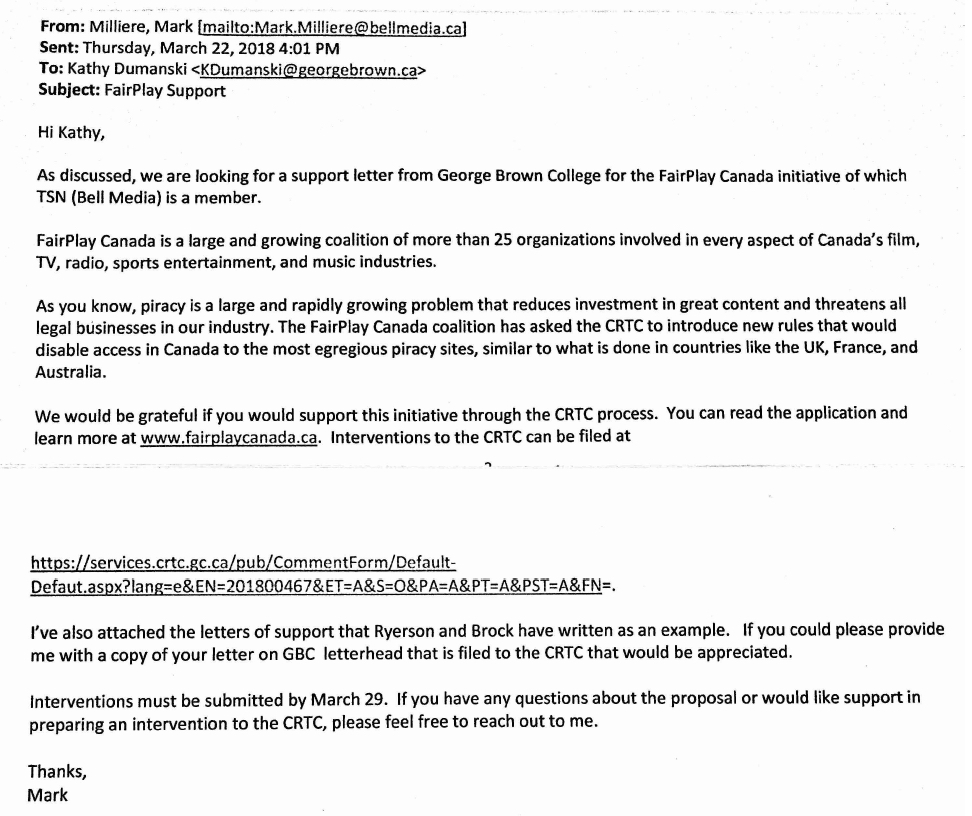
Bell George Brown request, March 22, 2018, obtained under FIPPA
The contact forwarded internally, noting Bell’s support for the school and its programming.
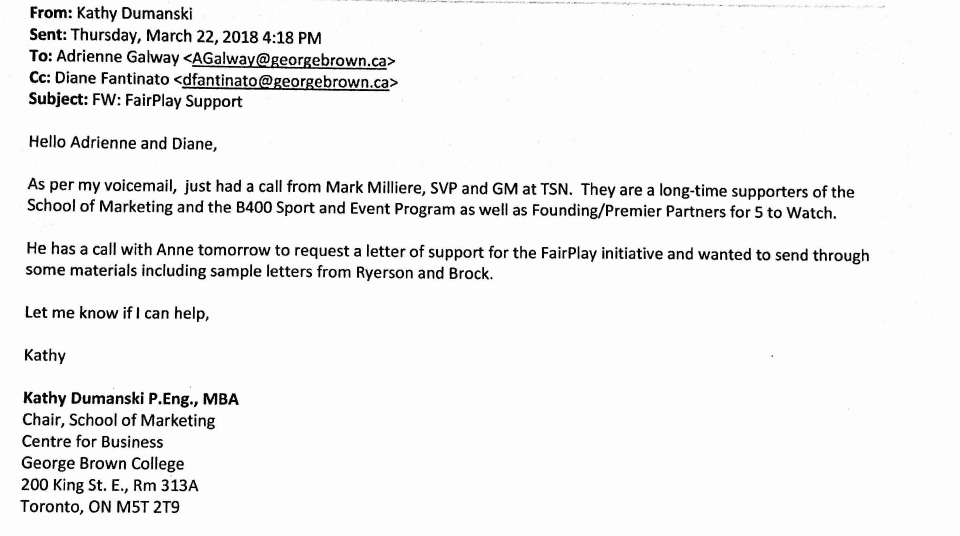
Dumanksi Email, March 22, 2018, obtained under FIPPA
Once the issue made its way to Sado, she asked her team whether there were reasons not write a letter, advising that she would speaking directly to Bell.
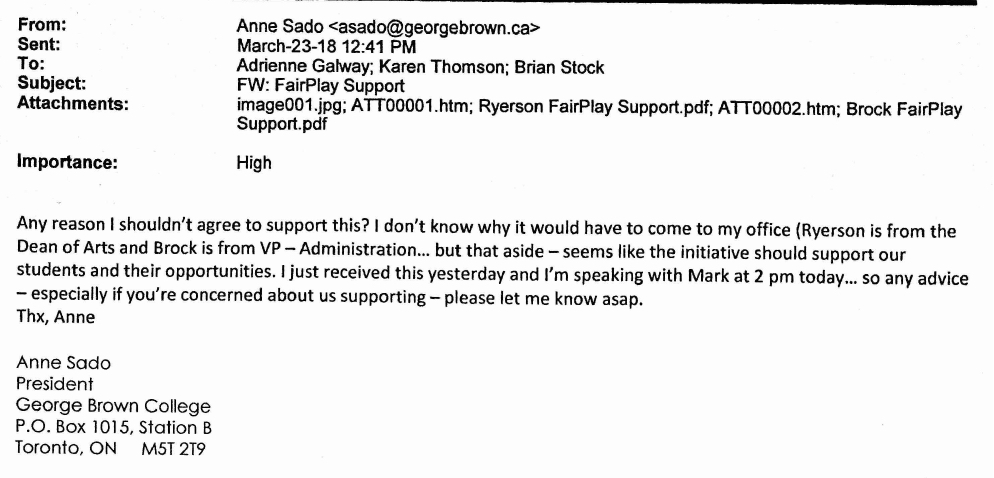
Sado Email on support, March 23, 2018, obtained under FIPPA
That sparked a warning from the Director of Corporate Communications that there were concerns and some risks. After Sado spoke directly to Bell, she dismissed those concerns and decided to write the letter, though notably asked Luigi Ferrara, the College’s Dean of the Centre for Arts, Design and Information Technology if he would be willing to write the letter in his name.
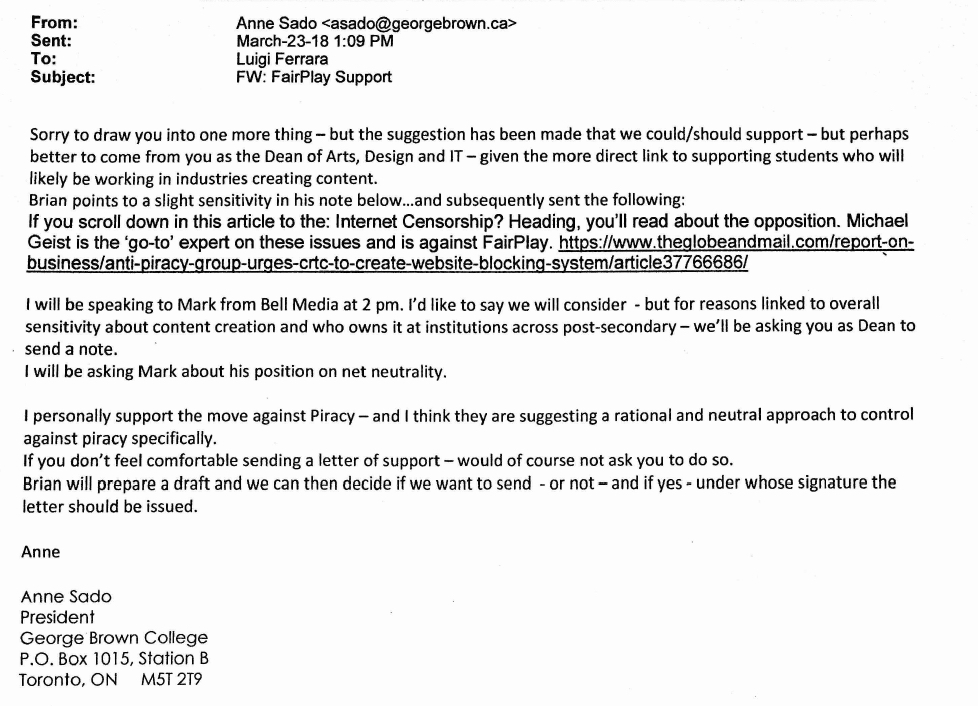
Sado Email to Ferrara, March 23, 2018, obtained under FIPPA
After Bell advised that the letter would have more impact if it came from the College president, the final submission came directly from her.
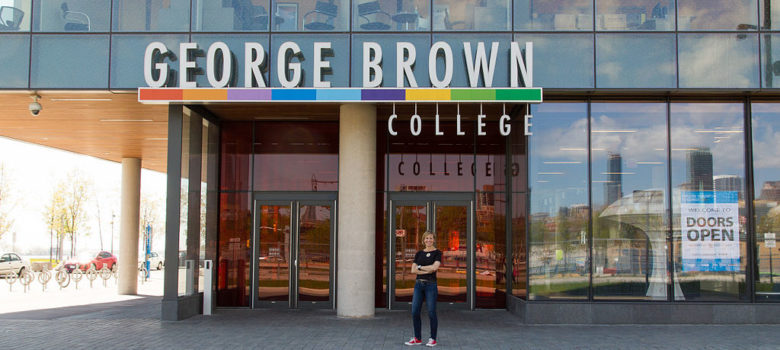







Not only is Bell unscrupulous, its actions border on the unethical. For supposedly independent college and university presidents to be euchered into backing Bell’s terrible proposal is disgusting – both on the part of the schools but on Bell for trying to pressure them into writing a letter.
I can only hope that the CRTC will see through this sham.
It is unseemly for an organization looking for support to mention that it is a financial supporter of the other organization in question.
Although if I read the correspondence correctly, it was one George Brown official mentioning this to another unprompted by Bell.
But the incontrovertible fact remains that young people hoping to work in the creative industries will see their livelihoods seriously threatened by piracy. And it is natural and right that an educational institution endorse reasonable initiatives to limit that piracy and thus its impact on their students.
The whole brou-ha-ha over the website blocking proposal overlooks key facts of the proposal, and spreads a lot of misinformation in their place.
Under the proposal, following a complaint to and investigation by the CRTC, alleged pirate sites will receive a letter informing them of the complaint and inviting them to respond and disprove the allegations against them. Ever been hauled into the principal’s or dean’s office because someone complained you plagiarized your term paper? Same thing. You get a chance to explain the situation and set the record straight.
That’s reasonable procedure number one.
If the site complained about does not reply – and it would indeed be humorous to see Pirate Bay or Libgen refute that they are pirate sites – then the CRTC has the option of blocking the site.
The legal precedent for this is simple and clear. If you’re selling fake Gucci handbags on the street corner and Gucci complains, the cops show up, the look over your wares, they ask to see your invoices for your inventory, etc. They ask to see your vendor’s permit, etc etc – and all sorts of equivalent things exist for websites: is their whois data hidden? are they registered in the Comoros Islands or Iceland? What is their corporate structure, is it publicly available? – and generally size you up. If, on the basis of some expert opinion, they decide your handbags are counterfeit, they lay a charge and SEIZE YOUR GOODS as evidence at trial and to remove them from the market while a court case is pending. Same with medicinal remedies not approved by Health Canada – if you can’t show your approval letter, the goods are seized.
Why should the contents of pirate sites not be “seized” in this way? In fact nothing is being seized at all, which is a wonderful turning of the tables on the pirates, who insist that their piracy is neither illegal nor immoral because they “aren’t stealing a physical object, they aren’t depriving the owner of the use of it, they’re just making and ‘sharing’ a virtual copy of it, no harm done.”
And then the pirate site can still appeal the blocking. When this is strong prima facie evidence of piracy, it puts the onus on the pirate and not the victim to explain the situation and defend their actions before a federal administrative tribunal, just like someone selling Chinese miracle cure products on the street corner. A presumption of innocence yes, but that does not mean you can just keep doing what you’re doing – selling dangerous medicinals, pirating my work – until a tribunal rules on it. That’s why Paul Manafort is in prison awaiting trial, because of the potential danger of letting him remain at liberty given the credible accusation of witness tampering.
So no more propaganda please, thank you.
George, you sound reasonable in your response. However, the only propaganda being passed is yours. You use a flawed argument to support your position and use terms which are presumptive at best. Comparing a web site where users upload commentary and materials to a fake Gucci bag seller is a serious flaw. Both are presumptive and dangerous to assume. Not getting into the Gucci bag seller scenario which in itself is interesting, the web site owners as a whole are being held held to such a high standard as to threaten their ability to operate if this plan is allowed to stand. There are unfortunately bad actors on both sides and as in life they will always be there. However, Bell will be allowed to shut any site down with any complaint and that site will be blocked until a defence is successful. This will not be a cessation of business for a few minutes but potentially months if not years. And should the defender be successful and the sad part is many will be (important point here – supported by past experience in the U.S. ) there will be no mechanism for redress. Copyright Holders should be made to bare the costs, not you or, certainly not the ISPs. Legal redress has always been available, and rights holders should not be given special privileges because they have the money to lobby government. I could go on but this is a complex issue and would take more time and education to correct at this time.
Completely false and false reasoning. One reason these sites exist is because most copyright holders, including myself, have no practical means of bearing the cost of fighting piracy. And then if I won against one site I would never be able to collect, because they’re registered on some island somewhere, and another one would take their place. That is not effective legal redress. The pirates are playing the system so the system needs to be changed.
All that is required is a high standard. You make it sound so innocent, “uploading materials.” Have you ever seen a torrent site? Can you tell me what about it is ambiguous or liable to error in identifying its nature, purpose and contents?
The proposal has all kinds of mechanism for redress. If a pirate in, I don’t know, Malaysia wants to fight a blocking order in Canada – mind you, just Canada, so it is by no means a “cessation of business,” that’s propaganda again. These are global players. I should at least be able to stop the kid next door from downloading my work using Canadian ISPs etc.
So, just to be clear. I complain to the CRTC that michaelgeist.ca is infringing my copyright, then Bell blocks it until the CRTC investigation is complete? What’s your website George?
you’re either blind or stupid or both. Someone makes a complaint to the CRTC, they look the matter over the way the cops look over your “Gucci” bags, and if the CRTC feels the complaint has merit they write a letter, a simple letter, to the website asking for an explanation of what looks prima facie to be criminal behaviour involving the complainant’s intellectual property – provisions against the violation of which can be found in both provincial civil codes and the federal Criminal Code. If the site does not reply, or the reply is unconvincing, the CRTC has the discretion to block the site in Canada. Then the site can launch a formal appeal. Got it? It’s actually a lot more lenient and careful than the response to some guy selling fake Gucci bags or someone selling Chinese herbal potions which Health Canada has prohibited.
Gucci gets free publicity over the “problem” of counterfeits. They are not going broke. The people who buy $5 Rolex on the street would not buy a $2500 Rolex.Rolex is not going broke.
Similarly, torrents get to people who would not dream of paying $30 to see Hot Tub Time Machine 2 in a theatre. Sony pictures is not going broke.
Disney and Bell etc would like to charge me with theft if I listen to a neighbour’s car radio, or read a newspaper over somebody’s shoulder. They imply that the “value” of a copied file is multiple times what the cost of buying the physical media is.
Bell is a company started via a government mandated monopoly that has been allowed to grow into a vertically integrated bully.
Here, Rob showcases pro-piracy libertarian “thinking” at its finest. You guys are geniuses.
> “Completely false and false reasoning. One reason these sites exist is because most copyright holders, including myself, have no practical means of bearing the cost of fighting piracy.”
Yes, you are a poor starving artist unable to make ends meet because of this “piracy” you speak of all day every day. That is why you spend all day every day trolling this site because you have nothing better to do than to insult everyone who dares to have an opinion different than yours. Must be nice being an “artist” with so much free time on your hands.
Sorry George but you need to provide links to what materials you are referring to. Everything I have read so far (including FairPlay Canada refers to a block on notice approach where the only legal redress is Federal Court. I understand the reasoning for a block on notice to mitigate damages to rights holders , however the collateral damage is too high for what is gained. And next time don’t make assumptions about where commenters like myself stand, kicking the people who actually support artists only weakens your position. Cool heads need to prevail.
I shouldn’t make assumptions about where you stand, and then you state later exactly where you stand, and it is in opposition to the rule of law, respect for my intellectual property, etc.
George reread my posts. I fully support rights for artists and most definitely support rule of law. It is this proposal that flies in the face of rule of law. We as a society cannot this policy to stand. And you should not either. History has repeatedly shown how this approach is bad for a society.
There’s probably a good reason why “George” posts anonymously.
Try addressing the issues.
Judging by your (often rude) comments it would seem that you are not here to benefit Canadian artists, nor to protect the internet from abuse, but rather to troll for some corporate interests. That is why my comment about you posting anonymously is addressing an important issue in this comment section.
I have lots to say about internet issues in this case, and also a lot about the welfare of artists in this Country. I can proudly say that I’ve spent most of my 70 years representing artists, and also that I’ve got a vested interest in the internet, based in part on the fact that I’ve been technically involved with it since its inception. However, there doesn’t seem to be anything that I could possibly tell you, or even discuss with you. You’re on your own track here, and it’s clearly not a constructive one.
Wouldn’t it be nice if we could have a forward looking talk about how to pay artists in Canada, and at the same time keep the internet free and open for all people to use without corporate interference. That would be my agenda. What’s yours?
Complaints about piracy is corporate interference? You guys can spin anything to your libertarian agenda. Start by explaining what’s wrong with administrative review of illegality on the Internet, and why torrent sites benefit from “freedom of expression.”
I agree Ole, we need forward thinking and actual discussion to try and solve this without the potentially catastrophic collateral damage that could come from knee jerk solutions to the what really is a complex issue. And Bell, being one of rights holder through its various acquisitions should not be allowed to set a policy that is so self serving and dangerous. Never mind the methods it uses to try and create a sense of public support.
Piracy a complex issue? There you have it in a nutshell. It’s not. It’s illegal and easy to identify. It’s currently hard to stamp out. That is not fair.
By the way, all these private e-mails is presented by Geist as some sort of scoop into corrupt behaviour on the part of George Brown officials. I don’t see anything untoward in their discussion amongst themselves at all. They have been contacted with a request (they must get a million like this: will they join a call to ask someone to do X or Y) and they discuss it amongst themselves, citing in particular the need to endorse reasonable, bona fide proposals to combat piracy with which their graduates will be faced. Show me one untoward comment in the entire exchange.
The problem is that what should be an independent public institution is doing the lobbying bidding of Bell. The College is motivated by it’s desire for financial contributions from Bell.
The industrial engineer joined Bell Canada immediately following her graduation from U of T Engineering. After spending 25 years working her way up the corporate ranks, she decided she needed a change.
Ms. Anne Sado serves as President of George Brown College since January 2004. Ms. Sado serves as Chairman of The Ontario Research and Innovation Optical Network (ORANO) and has been its Director since 2004. She is also a Director at Association Of Canadian Community Colleges since June 2005. She is a Member of Advisory Board of DHR International, Inc. Previously, Ms. Sado was the Senior Vice-President, Business Processes and Operational Effectiveness at Bell Canada. …
You still haven’t demonstrated that it was inappropriate for George Brown to endorse an initiative to combat something that will have an effect on its students trying to earn a living after they graduate. Something which is a criminal act under the Criminal Code of Canada, by the way.
Was the approach to George Brown inappropriate (“hey Ms Sado, it’s your old boss, we give your school money, you have to sign this”)? Should the school not take a stand on vital issues because someone on its management team *used to* have ties to a party to the matter?
Yes it was inappropriate. There is no point in debating with you, as you seem to hear or read nothing other than you are right and the rest of the world is wrong. We could also start advocating to shoot all civilians to eliminate theft and murder, and avoid courts all together. You may laugh and ridicule that last statement but this is what your position boils down to. Bell wants to side step rule of law because it’s easier. There is one thing for a respected school to facilitate discussion on the issues but it’s another to actively advocate a particular position. Sorry you can’t see the forest for the trees as you work to burn it down.
There are all kinds of “para-legal” bodies and processes at work in Canada that don’t involve the police and courts. Government landlord-tenant bodies can evict tenants, rule on sometimes large financial disputes. In some provinces these decisions are made not by judges but by notaries. Notaries! It’s simple. The CRTC proposal involves giving the owner of a site alleged to be engaged in piracy a chance to demonstrate that the allegation is false before a government administrative tribunal, the CRTC. Sounds fair to me.
Paralegals have no legal authority to do anything other than assist lawyers and non lawyers in day to day functions like contract creation and mundane tasks as assigned by lawyers. Hence the term “para-legal.” Landlord tenants not much more. And thank you for making my point. Bell wants to sidestep courts to create quasi kangaroo courts who can interpret whatever law it wants to create as it sees fit. The CRTC was created to regulate and monitor the Telecommunications and Radio operators. It was never meant to replace the courts in the decision making process of things like fair use and copyright infringement. It is clear you are not getting it, and continue to advocate for something that should never be. There are many things that copyright maximalists would call piracy which are in fact perfectly legal and this would given those maximalists an opportunity to sidestep Canadian courts but you can’t see beyond those pesky pirates. But you are not totally wrong, piracy is an issue that needs to be dealt with, just not in this manner. And getting back to the article that started this, it is definitely wrong for a school to advocate any particular proposal or plan. They exert an incredible amount of influence on students and take way a students ability to make choices for themselves. What should have happened was a discussion on the subject, allowing all interested parties to participate. You are allowed to have your position and regardless of whether I agree or disagree, I believe very strongly that you should still be able to have them. This decision by a person or group to advocate for Bell’s proposal took that right away from those who may disagree. How would you feel if the school instead advocated against the Bell proposal? I would feel this equally wrong for the same reasons as before.
Duh, “para-legal” was in scare quotes because I was not referring to the individuals with that job title but to quasi-judicial bodies and processes – yes, I should have just called them that, I was in a hurry.
Wrong for a school to advocate (and by extension oppose) any proposal or plan? Like arming teachers perhaps? (Oppose.) Or creating safe environments? (Advocate.)
The CRTC has every qualification to rule on quasi-legal matters such as access to the Internet through Canadian ISPs, just as all sorts of bodies – provincial Human Rights Commissions, Workers’ Compensation Boards, rule on quasi-legal matters and make decisions regarding financial settlements (awarding damages for hate speech is a broadly analogous one with the CRTC proposal in its fundaments), landlord-tenant commissions (getting evicted by a tribunal headed by a notary, with legal recourse beyond that in the form of an appeal to the courts), etc etc. The fact is incontrovertible.
I love the mumbo jumbo also. “A school Influences the way students make choices for themselves,” or some such rot. They choose to be pirated? There is a legitimate moral or legal debate around a criminal action such as piracy? I don’t think so. You’re just applying a so-called progressive language to a topic which is not progressive, like refusing to bake a wedding cake for a gay couple because of one’s “freedom of religion” blah blah. Piracy is not a freedom of expression issue and represents no moral quandary. Period.
“There are many things that copyright maximalists would call piracy which are in fact perfectly legal and this would given those maximalists an opportunity to sidestep Canadian courts but you can’t see beyond those pesky pirates.”
No, because of the oversight involved. Any such attempt would be spotted and rejected. This goes back to one of your buddies being able to offer only an ISP blocking a site as evidence of this. The ISP was obviously acting on its own, without oversight, without the legal expertise to recognize what is and isn’t illegal. The CRTC is supremely qualified to adjudicate this.
George, it is not mumbo jumbo. This is a truth that most respected schools understand and that is why it was so strange for this particular school to do that. And you are clearly either not paying attention to the discussion or trolling. Before you comment further, reread the comments. You see this issue isn’t about piracy, but about a school taking a single policy and supporting it, to the detriment of its students. I have been in support of your position. I just happen to live in this world where I also see larger pictures and small things like this that seem simplest at first turning into a bigger mess, and in some cases blood in the streets. Justice and rule of law can never be easy. And Justice which is what you need, is not always matched to law. So we need to work to make that happen. But in anger and pain, we often don’t know or see this.
So a school can’t come out in favour of a Human Rights Commission hearing complaints about sexual discrimination on its campus (as opposed to internal review, which UBC recently botched so badly – clearly botched administratively, regardless of what one thinks of the final findings and actions of UBC). A school can’t sign a petition against arming teachers in the classroom. A school can’t express support for Ontario’s current sex-ed curriculum, planned to be axed by Doug Ford.
I don’t think so.
Not the same thing. The schools and incidents you provided are individuals having to respond to potential criminal issues. This definitely not the same thing as George Brown. If George Brown was implicated in a piracy case, then a position would have to be made to prepare for a defence.
On a side note George, thanks for the healthy debate., and I truly mean this. And everyone have a great Canada Day.
the sex-ed curriculum an individual responding to a potential criminal case?
and the point about UBC was this: A sexual assault victim’s group lobbies to have review of sexual harassment taken out of the hands of universities and placed in the hands of a quasi-judicial body such as the provincial Human Rights Commissions, with all their investigative expertise and legal powers. Some schools will be opposed, some in favour. You’re saying that a university chancellor can’t consult his or her senior management, as George Brown did, and express an opinion on behalf of the school’s administration? I don’t think so.
And on behalf of the administration, note: no one is saying they are speaking for the students or the entire university community. Faculty and student associations can also express themselves on this issue.
I would bet you dollars to donoughts that should it ever sadly come to pass that Michael Gesit, say, were the victim of public hate speech, he would not hire a lawyer and sue the party in civil court, an extremely expensive proposition.
He would walk into the Ontario Human Rights Commission and file a complaint, as it is his legal right to do. And the Commission would investigate, with a trained investigator and clear guidelines and policies, would give ample opportunity to the alleged perpetrator to explain their actions and make a determination, which could include cash damages, and social stigmatizing of the other party. If either party is dissatisfied with the ruling they can address their concerns to a civil court.
Now, note that in the case of defamation, for example, no such quasi-judicial recourse is available. Why? Because society has made the decision to offer individuals certain rights and protections against hate speech, which is a social ill, and not defamation, which is an individual matter.
You’re saying that the CRTC, or some other body, should not be allowed to play a similar role in hearing complaints about criminal activity, much of it taking place offshore in dark corners of the free-for-all we call the Internet, which infringe my human right to earn a living from my work.
Here too the problem is a social ill, not an individual, isolated harm against which I have to fend for myself. The widespread and systematic attack on the ability of large numbers or generally already impoverished Canadian creators to earn a living from their work is a social ill which requires a collective, state-sanctioned and overseen response, one more practical than telling me to go sue some website in China because the site has freedom of expression rights in Canada which must be protected at all costs.
A good summary of the issues and where Doctor Geist is rather fast and free with the facts and the truth:
https://www.barrysookman.com/2018/03/29/fact-checking-michael-geists-criticisms-of-the-fairplay-site-blocking-proposal/
Pingback: "One of Our Key Hiring Companies": The Missing Link in the George Brown College Support for Bell's Site Blocking Plan - Michael Geist
Pingback: Behind Ryerson's Support for Site Blocking: Bell Reviewed Draft Submission, Was Warned It Did Not Represent Faculty View - Michael Geist
Pingback: Bell allegedly lobbied Ryerson University to support FairPlay website-blocking coalition - Apple Watch 101